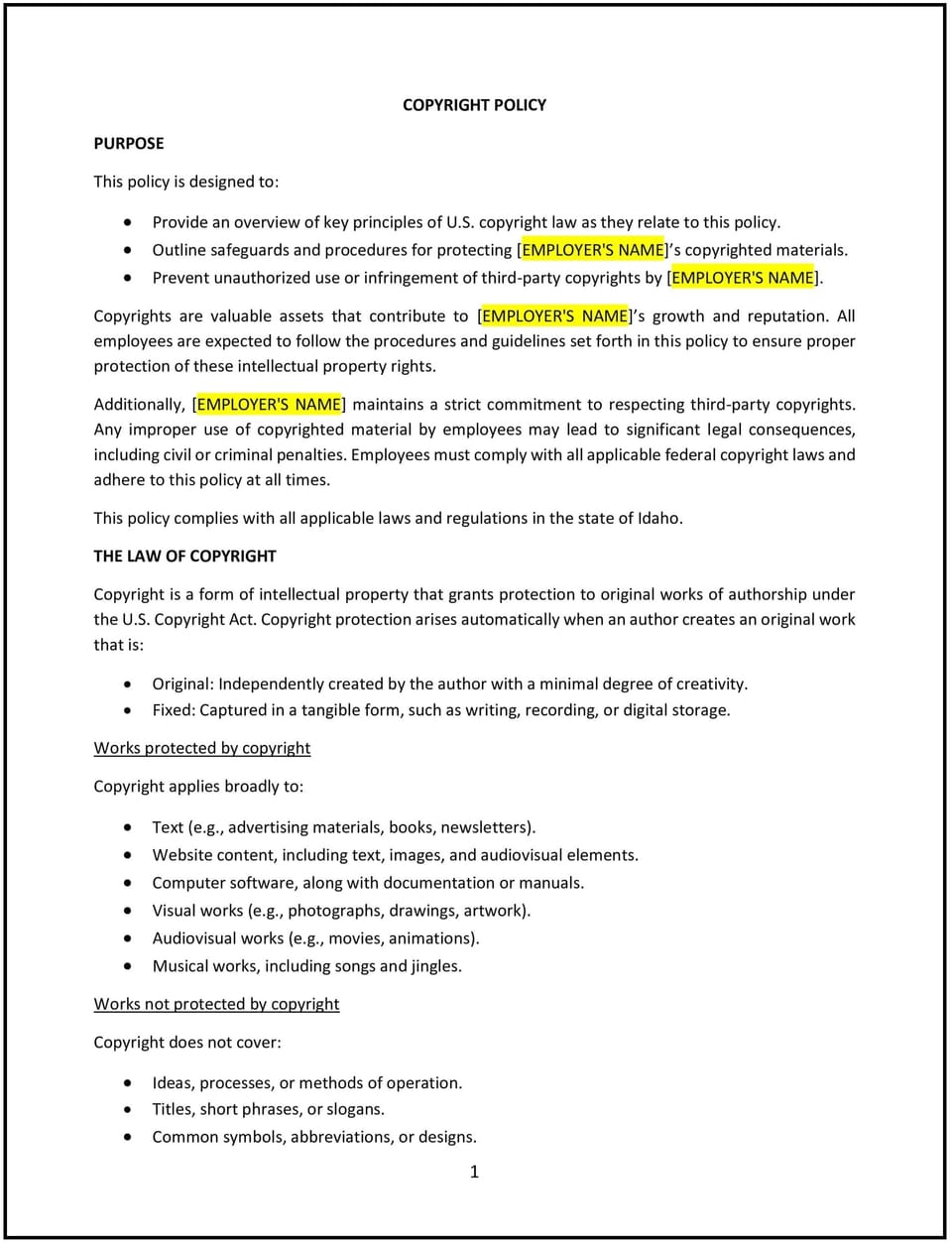Copyright policy (Idaho): Free template

Copyright policy (Idaho)
A copyright policy helps Idaho businesses establish guidelines for protecting original works, respecting intellectual property rights, and avoiding copyright infringement. This policy outlines the business’s approach to creating, using, and sharing copyrighted materials, as well as the procedures for addressing potential violations. It reflects the business’s commitment to ethical practices and legal standards.
By implementing this policy, businesses can protect their intellectual property, avoid legal disputes, and foster a culture of respect for creative works.
How to use this copyright policy (Idaho)
- Define copyright ownership: Specify who owns the rights to works created by employees, contractors, or third parties, such as content, designs, or software.
- Outline permitted use: Provide guidelines for using copyrighted materials, including internal use, external distribution, and third-party collaborations.
- Address licensing: Describe the process for obtaining licenses to use third-party copyrighted materials and ensure proper attribution.
- Establish reporting procedures: Provide a process for employees to report potential copyright violations or disputes.
- Communicate consequences: Clearly state the disciplinary actions for copyright infringement, such as misuse of protected materials or failure to obtain proper licenses.
- Train employees: Conduct regular training sessions to educate employees on copyright laws, the policy, and best practices for using creative works.
- Review and update: Regularly review the policy to ensure it remains aligned with copyright laws, business needs, and Idaho regulations.
Benefits of using this copyright policy (Idaho)
This policy provides numerous benefits for Idaho businesses:
- Protects intellectual property: The policy safeguards the business’s original works and ensures proper ownership and usage rights.
- Reduces legal risks: By outlining proper use of copyrighted materials, businesses can avoid disputes, fines, or lawsuits related to infringement.
- Encourages ethical practices: The policy fosters a culture of respect for intellectual property and creative works.
- Provides clarity: A well-defined policy ensures consistent handling of copyright-related matters and reduces potential misunderstandings.
- Supports collaboration: Clear guidelines for licensing and attribution help businesses collaborate with third parties while respecting copyright laws.
- Enhances reputation: Demonstrating a commitment to ethical copyright practices can improve the business’s reputation among clients, partners, and employees.
- Aligns with legal standards: The policy helps businesses adhere to federal and Idaho copyright laws and industry best practices.
Tips for using this copyright policy (Idaho)
- Communicate the policy effectively: Share the policy with employees during onboarding, training sessions, and through internal communications to ensure awareness.
- Train employees: Provide training on copyright laws, the policy, and best practices for using and protecting creative works.
- Monitor usage: Regularly review how copyrighted materials are used within the business to ensure compliance with the policy.
- Document licenses: Maintain records of all licenses obtained for third-party materials and ensure proper attribution.
- Address violations promptly: Investigate and resolve potential copyright violations quickly to minimize risks and demonstrate accountability.
- Review the policy regularly: Update the policy as needed to reflect changes in copyright laws, business needs, or Idaho regulations.
- Lead by example: Encourage leadership to model ethical copyright practices and demonstrate a commitment to the policy’s principles.
Q: Why should Idaho businesses have a copyright policy?
A: A copyright policy helps businesses protect their intellectual property, avoid legal disputes, and foster a culture of respect for creative works.
Q: What types of works are covered under this policy?
A: The policy covers original works such as content, designs, software, and other creative materials created by employees, contractors, or third parties./
Q: How should businesses handle third-party copyrighted materials?
A: Businesses should obtain proper licenses, provide attribution, and follow usage guidelines when using third-party copyrighted materials.
Q: Who owns the rights to works created by employees?
A: The policy should specify ownership rights, typically stating that works created by employees during their employment belong to the business.
Q: What happens if an employee violates the copyright policy?
A: The policy should outline disciplinary actions for violations, such as misuse of protected materials or failure to obtain proper licenses.
Q: How should businesses address potential copyright disputes?
A: Businesses should establish a process for reporting and resolving disputes, including investigating claims and taking corrective actions as needed.
Q: How often should the policy be reviewed?
A: The policy should be reviewed annually or as needed to reflect changes in copyright laws, business needs, or Idaho regulations.
This article contains general legal information and does not contain legal advice. Cobrief is not a law firm or a substitute for an attorney or law firm. The law is complex and changes often. For legal advice, please ask a lawyer.


